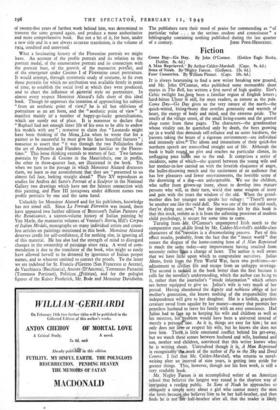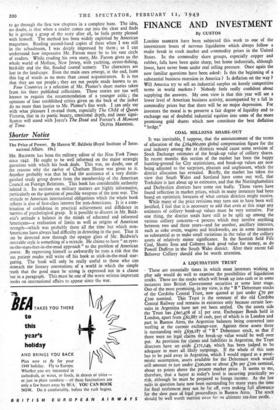Fiction
IT is always heartening to find a new writer breaking new ground, and Mr. John O'Connor, who published some memorable short stories in The Bell, has written a first novel of high quality. Eire's Celtic twilight hasjong been a.f;miliar region of English letters-; hard-bitten Ulster ri still, for most readers, as remote as the pole. Come Day—Go Day gives us the very nature of the north—the quick-wined, bitingootrony that overlies generosity and warmth of heart, the energy of body and mind, and the extreme pride. The smells of the village street, of the small living-rooms and the general shop come from these pages. The characters—the grandmother whose vitality can, bequenched only by death, the boys growing up in a world that demands self-reliance and an outer hardness, the 'parents taking the brunt of a rigorous environment—are individual and intensely alive. .k The idiom and intonations of their quick-fire northern speech are transcribed straight out of life. Although the book is built rou no plot and reaches no particular climax, its unflagging pace hligs one to the end. It comprises a series of incidents, some of which—the quarrel between the young wife and her mother-in-law, carried on with the feverish eloquence of anger, the bullet-throwing match and the excitement of an audience that has few pleasures and fewer entertainments, the horrible scene of the drowning of a dog—are unforgettable. We see the children, who suffer from giown-up irony, about to develop into mature persons who will, in their turn, wield that same weapon of irony and gain with the years the wisdom of the old. When the grand- mother dies her younger son speaks her eulogy : "There'll never be another one like the ould doll. She was one of the real ould stock, they're dying out now," but the impression left by this book is that this stock, remote as it is from the softening processes of modem child psychology, is secure for some time to come.
Turning from 4Ar. O'Connor's unpampered Irish north to the comparative ease,Of4ife lived-by Mr. Calder-Marshall's middle-class characters of the-"twenties is a disconsolating process. Part of this effect results, probably, from the fact that the "insect world" that rouses the disgust of the home-coming hero of A Man Reprieved is much the same today—any improvement having resulted from necessity rather *an a change of heart. The author is well aware that we have little upon which to congratulate ourselves. Julius Akens, fresh fran the First World War, faces two problems—re- adjustment to civilian life and escape from an unhappy m2rriage. The second is tackilid in the book better than the first because it calls for the novelist's understanding, which the author can bring to it, rather than the journalist's "inside information" which others are better equipped to give us. Julius's wife is very much of her period. Having abandoned the dignity and noblesse oblige of her mother's generation, she knows nothing of the responsibility that independence will give to her daughter. She is a foolish, gracele§s creature saved from squalor by her money—money that permits her penniless husband to leave his family with an easy conscience. Had Julius had to five up to keeping his wife and children as well as his mistress, his •nroblem would have been a universal instead of merely a persona/1'one. As it is, things are easy for him ; he not only does not le. or respect his wife, but he knows she does not love him. The is little emotional conflict behind his get-away, but we watch these scenes between husband and wife, husband and son, mother and children,_ convinced that this writer knows what he is writing about. Unresolved though it is, A Man Reprieved is recognisably'ths..vvork of the author of Pie in the Sky and Dead Centre. I feel that Mr. Calder-Marshall, who returns to novel- writing after an interval 'of nine years, is getting into stride for greater things. This, however, though not his best work, is still a very readable book. Mr. Negley Parson is an accomplished writer of an American school that believes the longest way round is the shortest way of intriguing a reading public. In Sons of Noah he approaches so obliquely a simple story about a girl who cannot marry the man she loves becaushe believes him to be her half-brother, and then finds he is not 14r, half-brother after all, that the reader is likely to go through the first tew chapters in a complete haze. The idea, no doubt, is that when a reader comes out into the clear and finds he is getting a grasp of the story after all, he feels pretty pleased with himself. The method has been widely exploited by American magazines. Reading, second-hand copies of these when I was still in the schoolroom, I was deeply impressed by them ; so I can understand how impressive Mr. Farson must he to his vast circle of readers. While, evading his own story, Mr. Farson gives us the whole world of Mollusc New Jersey, with yachting, oyster-fishing, bird-life and the flat, flooded coastal-scenery. The characters are lost in the landscape. Even the main ones emerge, at the end, from this fog of words as no more than casual acquaintances. It is not that they are not people they are not people made known to us.
Four Countries is a selection of Mr. Plomer's short stories taken from his three published collections. These stories are too well known to require the recommendation of a younger critic ; the opinions of four established critics given on the back of the jacket do no more than justice to Mr. Plomer's fine work. I can only say with what pleasure I re-read them, especially The Child of Queen Victoria, that in its poetic, beauty, emotional depth, and inner signi- ficance will stand with Joyce's The ,Dead and Forster's A Moment







































 Previous page
Previous page